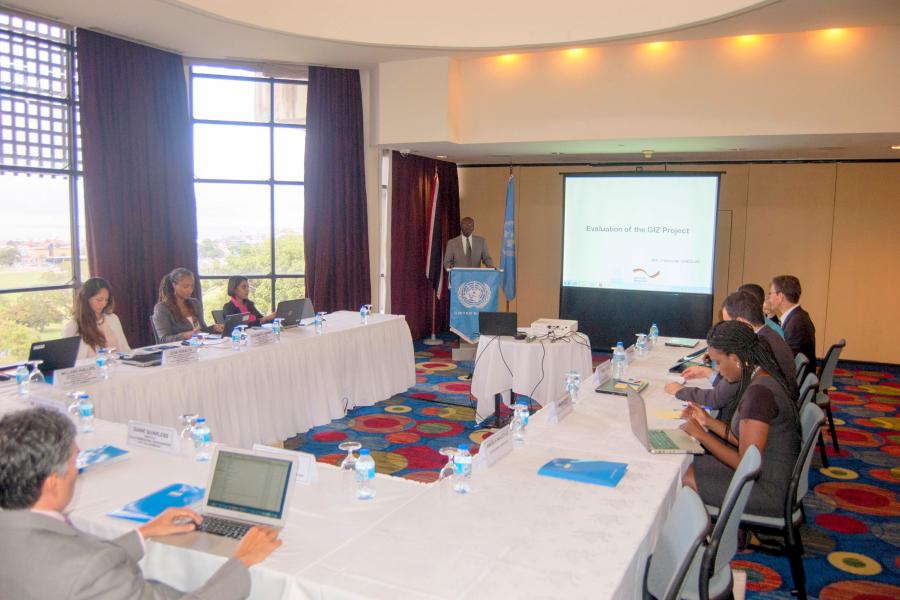Sustainable energy in the Caribbean: Reducing the carbon footprint in the Caribbean through the promotion of energy efficiency and the use of renewable energy technologies
Work area(s)
Topic(s)
This project seeks to examine financing opportunities which will provide greater incentives for the development of energy efficiency measures and renewable energy technologies. Due to high energy costs, several countries employ subsidies on fuel consumption to redress the challenges to the poor and to drive down production costs. In examining the policy landscape the tradeoffs between incentives to renewable energy and the challenges of poverty alleviation must be properly addressed in examining binding constraints. The assumption is that big gains can be made in energy savings through energy efficiency and a reduction in the enormous energy bill by the use of renewable sources of energy. However a careful analysis must be made of feasible actions and incentives especially at a time of fiscal stress. The CARICOM, in consultation with member states has developed a regional energy policy. Apart from CARICOM, there is no other regional entity in the Caribbean subregion that is working assiduously on energy initiatives and the support is rather disparate. It must be remembered that although the subregion contributes to less than 1% of carbon emissions it will be among the first to be impacted by changes in climate especially sea level rise that threatens the coastal and marine populations and resources. It has therefore become necessary to develop a definitive programme of support to the Caribbean in an attempt to reduce carbon emissions through the development of a low energy pathway. In this regard, it is important to sensitise the public to the impact of the carbon footprint and to put in place the appropriate measures and strategies in the management environment that would support the development and implementation of energy efficient and renewable energy initiatives.
Resultados
By the end of the project, national governments shall have new and/or innovative mechanisms for financing projects in energy efficiency and renewable energy and will be able to design and finance mechanisms to reduce carbon emissions.
In this regard, it is expected that Caribbean countries will have increased capacity to utilize new concepts, strategies and mechanisms for the formulation of projects in energy efficiency and renewable energy.
It is also foreseen that context-related, Caribbean mechanisms for promotion of energy efficiency will be strengthened throughout the region.
Finally, it is anticipated that the capacity of policymakers and technical experts at the national and regional levels for promotion of energy efficiency will be improved.
News:
-
 8 Sep 2016 | News
8 Sep 2016 | NewsSaint Lucia discusses transition of public vehicles to electric and hybrid
ECLAC and GIZ convene meeting to assess the impact of the project entitled “Sustainable Energy in the Caribbean: Reducing the Carbon Footprint in the Caribbean through the Promotion of Energy Efficiency (EE) and the Use of Renewable Energy (RE) Technologies”.
-
19 Jul 2016 | News
Dominica is CARICOM forerunner in renewable energy use, latest ECLAC report reveals
In the wake of the 2008 – 2011 financial crisis, and recognizing that its dependency on fossil energy increased its vulnerability to supply and price fluctuations, Dominica decided to pursue sustainable energy strategies that support the promotion of energy efficiency and renewable energy initiatives.
Activities:
-
8 Sep 2016, 05:35 - 13:00 | Meetings and technical symposiums
Evaluation of the project 'Sustainable Energy in the Caribbean: Reducing the Carbon Footprint in the Caribbean through the Promotion of Energy Efficiency and the Use of Renewable Energy Technologies'
The project entitled “Sustainable Energy in the Caribbean: Reducing the Carbon Footprint in the Caribbean through the Promotion of Energy Efficiency (EE) and the Use of Renewable Energy (RE) Technologies” seeks to strengthen the capacity of Caribbean countries in the areas of energy efficiency and renewable energy. The high-level meeting in Port of Spain will be jointly convened by ECLAC Caribbean and GIZ to assess the impact of this project, implemented from 1 July 2014 to 30 September 2016.
Related content
Dominica is CARICOM forerunner in renewable energy use, latest ECLAC report reveals
In the wake of the 2008 – 2011 financial crisis, and recognizing that its dependency on fossil energy increased its vulnerability to supply and price fluctuations, Dominica decided to pursue…
Country(ies)
Subregional headquarter(s) and office(s)
Financing type
Attachment(s)
-
Training Manual - Energy Efficiency
An assessment of fiscal and regulatory barriers to deployment of energy efficiency and renewable energy technologies in Belize
An assessment of fiscal and regulatory barriers to deployment of energy efficiency and renewable energy technologies in Curaçao
Report on Training Programme Conducted October 2013 in Guyana
Report on Training Programme Conducted November 2013 in Jamaica
Report of the regional dialogue and training workshop on energy efficiency and renewable energy initiatives in the Caribbean
Enhancing energy efficiency in national transportation systems
Strategic partner
Deutsche Gesellschaft für Internationale Zusammenarbeit (GIZ) GmbH
- http://www.giz.de
- +49 228 44 60-0